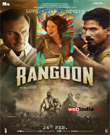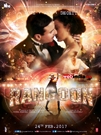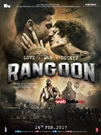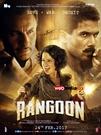|
|

|
|

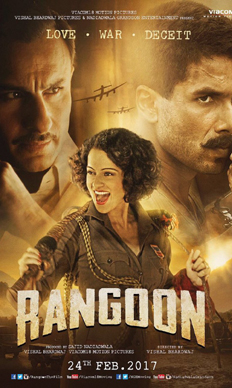
EDITOR'S PICK
'Rangoon': An impressively immersive film (Review By Troy Ribeiro , Rating: ****)
Rangoon is director Vishal Bhardwaj's monumental and rewarding work. It is a classic, weighed and measured by the style and manner of its narrative. Adapted from the English film "Casablanca", it is a simple romance triangle set in India, circa 1943, against the backdrop of World War II.
The plot, a trifle to hang the emotions on, involves an ex-actor turned film producer Rustom Billimoria aka Rusi (Saif Ali Khan), his lover and muse Julia (Kangana Ranaut) and the army personnel Jamadar Nawab Mallik (Shahid Kapoor) who is assigned to protect her during an arduous journey to the border, where she is deputed to entertain the Indian Army, serving under the British.
It is during this journey that the inevitable happens, she falls in love with Nawab Malik and soon realises that she is torn between the two.
The screenplay is well-designed. The narrative begins in a dispassionate tone but gradually during the course of the narrative, it emotionally hooks you on, making you root for every character.
The characters merging from various spectrums of society are deep, yet believable. They are well-etched and their backstories make them wholesome.
"Rangoon" is Kangana's canvas. She is the soul of the film as the perky actress modelled after the yesteryear's heroine Fearless Nadia. Her role is more difficult than it might appear. What she does here is as extraordinary in its own way as Nadia did during her times.
Her on-screen chemistry with Saif and Shahid is palpable. Kangana is downright luminescent and dives into her character's varied and heightened emotions with aplomb.
She has the chutzpah and spunk of Julia which seems natural. There are many scenes where she shines brilliantly. But the most striking of them all is the comic scene when she dances before the Japanese soldiers hoping to break the ice with them.
Shahid portrays Nawab Malik with all earnestness. With natural ease, he internalises his character and communicates his affection through his intense gaze. He is equally flawless in the action scenes.
Saif does not have much to do. As Rustom Billimoria, he plays the aristocratic producer with elan. He is convincing as the chauvinist lover yet deeply in love who is willing to go to any lengths to get his lady-love back.
British actor Richard McCabe as Major General Harding is spot on with his dialogues peppered with Hindi. He leaves his mark on-screen with flourish.
The rest of the supporting cast too are pitch perfect and some of their scenes, in their own ways are equally tender and stirring, be it when Zulfi, the make-up artiste and Julia's confidante, is mercilessly shot, the Japanese soldier held captive by Nawab and Julia makes a desperate attempt at a getaway and when the woman soldier is killed before her son.
Visually, the look and feel of the film is magnificent yet simply realistic. The landscape is beautifully exploited and the period created by Production Designers Subrata Chakraborthy and Amit Ray along with Dolly Ahluwalia's striking costumes captured by Pankaj Kumar's cinematography, are rich and rewarding.
The songs "Bloody hell" and "Mere miyan gaye England" are beautifully choreographed as well as picturised, while "Yeh ishq hai' is soulful. Also, Bhardwaj's lavish score tugs at your heartstrings as it complements the visuals.
Overall, "Rangoon" masterfully weaves a drama that keeps you enraptured till the very end.
'Rangoon': A Rudderless epic rescued by an excruciating exquisitness (Review By Subhash K Jha ; Rating: ****)
In art, as in life, consistency is not a quality that is easily obtainable. In the life that is created in Vishal Bhardwaj's art, the characters are so flawed and fractured and so driven down to destruction by their own demoniacal desires that you fear they would collapse under the weight of their own ambitions and longings.
This is true as much of the characters as the director himself. Bhardwaj's latest arguably his most ambitious film to date could have ended up being the "Bombay Velvet"/"Mohenjo Daro" of 2017. It is rescued, no, redeemed by an excruciatingly exquisite perception of the wounds and lashes that love pelts down on those who are its victims.
"Rangoon" is a simple tale, unnecessarily complicated by its characters' prevarications. It is a story pinned down to a bobbing blueprint of passion and betrayal by a fey feisty whimsical woman, a popular action actress of the 1940s, who is not, repeat not, Fearless Nadia... she is Fearless Julia… not afraid to wear her heart on her sleeves. And when you have Kangana Ranaut to play ‘Fearless Julia' it is easy to show the woman complete stripped of vanity in her lunge towards love.
Set in the 1940,for a large part of its narrative, "Rangoon" reads like an over-intellectualised literary excursion replete with educated well-informed arrogant and pompous references to the role of Subhas Chandra Bose's Indian National Army in bringing down the British Raj.
The references to the politics of the India's Freedom Movement are drawn out of the commodious plot with a groaning wheezing gravity, as though Bhardwaj, of all the learned elements in Indian cinema, knows that the Indian audience needs to be educated. He is visited the library,you see.
Tragically the characters from both the British army and the INA come across as caricatures cloaked in a gravitas that the screenplay is unable to pull out of the circle of intrigue and deceit that the screenwriters create to cheat on destiny. The British Major General Harding(Richard McCabe) sprouts Urdu poetry with an endearing lisp (Ghalib never sounded so glib) but soon begins to behave like the Gora villains in Manoj Kumar's "Kranti" and Manmohan Desai's "Mard".
McCabe is Tom.. Altered.
The erudition that Bhardwaj and his writing team slap on to the long-winded screenplay go a long way in slackening the story's pace almost to a near-inert place from where it is hard to pull ourselves out even when Shahid Kapoor and Kangana Ranaut's compelling chemistry is an inviting incentive.
By the time the plot reaches its third and final act, Bhardwaj gets totally carried away by his librarian's lyricism. He injects massive suffocating doses academia into his narrative with scholarly arrogance, sacrificing narrative evenness for interludes where Time come to a standstill as we see characters enacting scenes from the Freedom Movement on stage.
The skits-o-phrenia is distracting. Many of the characters appear to be wasted in the long-legged libretto on nationalism that Bhardwaj insists on playing out while we are meant to watch his paean to patriotic pride in submissive silence. Bhardwaj plays and sings variations of the national anthem so many times during the film that the audience in the theatre (all 25 of them) was confused as to whether they should just continue standing in reverent attention.
After all this is not just the Jana gana mana. It is Bhardwaj
playing the Jana gana mana.
A pity, he sacrifices the opportunity to tell a beautiful and tender love story
about three wounded fractured broken characters for the sake of a baggy ode
to desh bhakti replete with a climax on top of a precariously compromised wooden
bridge that David Lean would have used as a dress rehearsal for "The Bridge
On The River Kwai".
Aerial shots of WW2 war planes swooping down on the natives are so clumsily done they are proof of how far FX-driven Indian cinema lags behind its Hollywood counterparts, and why.
Peel away the layers of self-referential nationalism, and we are left with a luminous love story, a dishy desi version of David Lean's "Ryan's Daughter" and Vijay Anand's "Guide" about a capricious seductress in a committed relationship who strays into a passionate liaison with a near-stranger who is way out of her social league. Indeed the most masterly portions of the narrative are those where Kangana and Shahid are shown slogging through stretches of slush and marsh land accompanied by a Japanese POW.
Kagana and Shahid are extraordinarily at-home in expressing the eruption of unpremeditated passion. Their scenes together are magically shot by cinematographer Pankaj Kumar and are elevated further to a level of liberating lyricism by Vishal Bhardwaj's serene background score.
A pity Shahid and Kangana's time together is rationed. It ends
with the Japanese soldier (played with gratifying earnestness by Soturo Kawaguchi)
begging to be freed to go home to his mother.
Exactly our feelings.
His core desire was just to sing his heart out, but filmmaker Vishal Bhardwaj, in the later stage of his life, utilised his sense of music in a much meaningful manner in storytelling. Read More
Shahid Kapoor thanks Kangana for supporting 'Padmavati'Actor Shahid Kapoor, who plays one of the three key characters in "Padmavati", has thanked his "Rangoon" co-star Kangana Ranaut for extending her support to the controversial film, and said creative people shouldn't be scared.Read More
